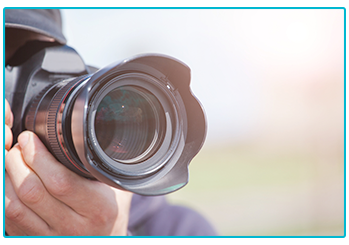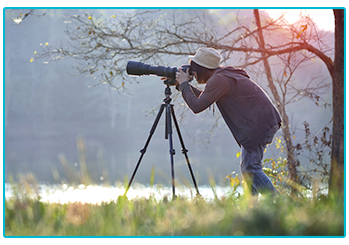
If you’re really starting to get into photography, no doubt you’ll be wanting to find out exactly what your camera is capable of! With SLRs and DSLRs, this will often mean finding out what kind of lenses might work best for your photography interests. However, with so many out there, it can be difficult to know where to begin. At The Insurance Emporium, we want to help people get the most from their passions. Which is why we’re lending a helping hand with our essential guide to camera lenses!
The basics
There are two factors affecting the function of your camera lens – focal length and maximum aperture. Focal length determines the distance over which the lens will be able to take an image. Your lens’ maximum aperture is the ratio of the diameter of its iris to its focal length – the smaller the ratio, the larger the iris, and your lens will allow more light onto the camera sensor. This will affect how well you can capture images in different conditions, in relation to your shutter speed.
Zoom vs prime

Camera lenses come in two basic varieties – zoom and prime. Prime lenses have a single focal length, whilst zoom lenses do just that; they allow the photographer to alter focal lengths so as to zoom in and out on a subject. Traditionally, zoom lenses have been heavier and haven’t allowed quite the same quality of image as prime, although modern materials have been helping to improve this.
Standard lens
This kind of lens is the most similar to your eye’s normal vision. If your camera came with a lens included, it’s probably a standard one, as these are able to capture the widest range of shot. You should be able to leave it on your camera all day long, knowing most of the shots you’re taking will work. If you’re looking to become more specialised, however, the following lenses could be worth looking at…
Wide angle
These lenses use a shortened focal length in order to do exactly what it says on the tin – take wide angle shots! This can be especially useful when photographing landscapes, so as to get as much of the surrounding area in frame as possible. Some wide angle lenses, known as fisheye lenses, curve outward to capture detail to around 180 degrees – although this inevitably comes with some distortion!
Telephoto

The opposite of wide angle lenses, telephoto have a longer-than normal focal length. A long focal length makes it easier to capture action that’s taking place further away, making them great for sports and wildlife photography. Be careful though, the longer the lens you end up getting, the heavier and more unwieldy they can become!
Macro
If you want to get up close and personal with wildlife, flowers or any other object, a macro lens could be the one for you! These lenses allow you to focus really close on the smallest of objects, such as a bee collecting pollen, for instance. With a macro lens you might even be able to capture images of objects that are larger than life, whilst maintaining the incredible detail!
Photography can be such a rewarding adventure, and we hope this guide can help you take your passion to new heights! No matter if you’re a professional, enthusiast or amateur photographer, the price of your equipment can be costly, so why not consider protecting it with camera insurance? The Insurance Emporium offer flexible Camera Insurance that can be tailored to suit you with our range of Optional Benefits, such as New for Old for Life. What’s more, you could also get a 25% Introductory Discount* when you snap up your policy. Head to The Insurance Emporium to find out more!
* The 25% Introductory Discount is available for the first 12 premium payments on lunar and calendar monthly policies or one premium payment on annual policies.
All content provided on this blog is for informational purposes only. We make no representations as to the accuracy or completeness of any information on this site or found by following any link on this site. We will not be liable for any errors or omissions in this information nor for the availability of this information. We will not be liable for any loss, injury or damage arising from the display or use of this information. This policy is subject to change at any time.


